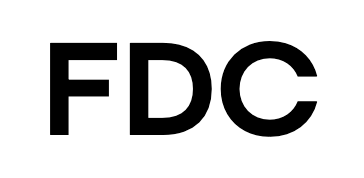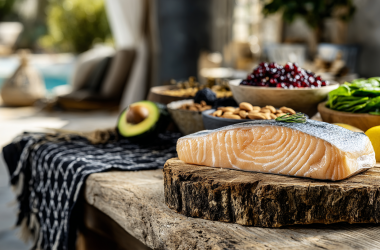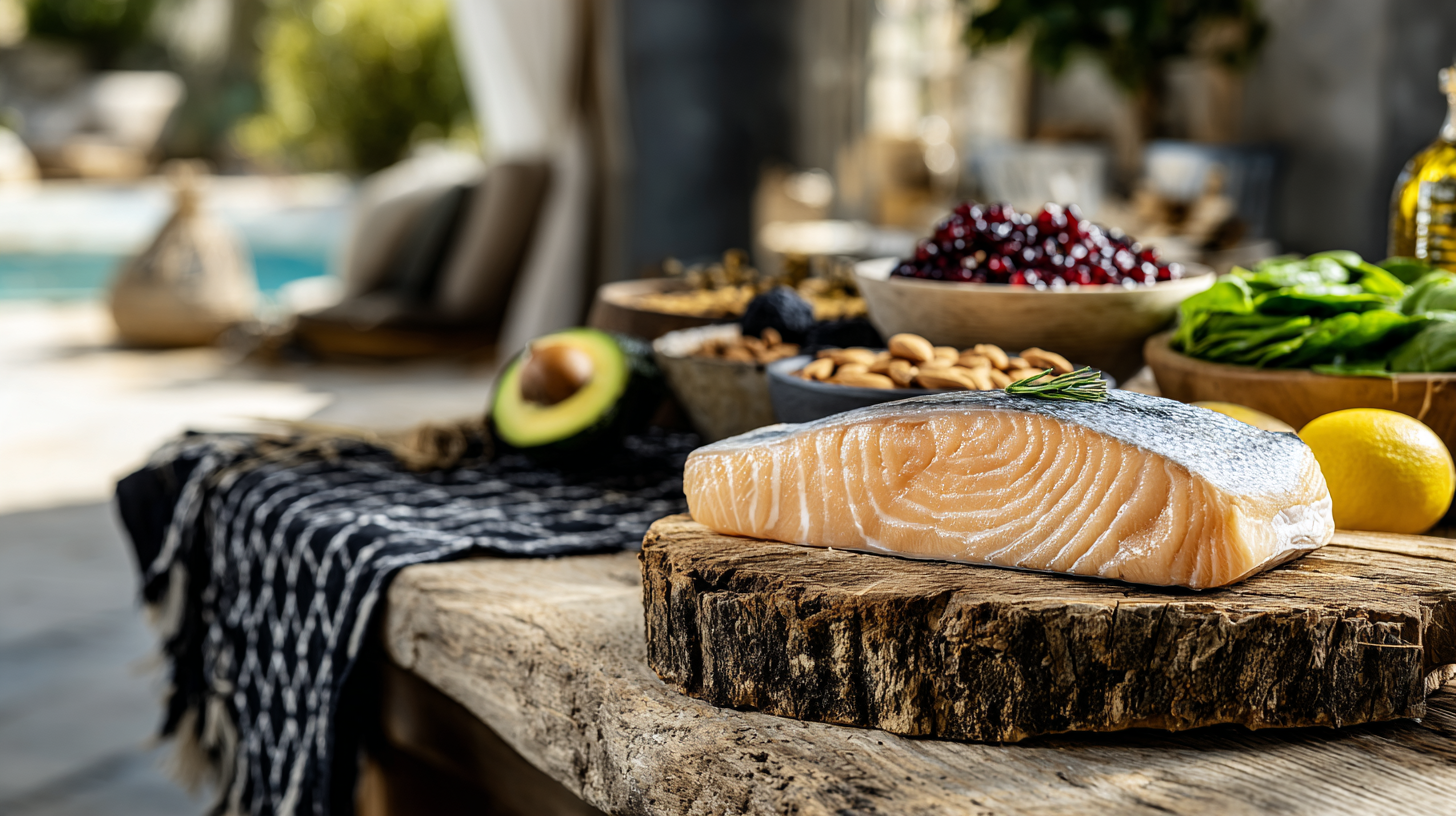Testosterone is key for muscle growth, energy, and health in men. As a doctor focused on men’s health for over 20 years, I’ve seen how food affects hormone levels. Many patients ask about natural ways to boost testosterone before medical options.
No single food instantly boosts hormone levels, but research points to nutrient-rich foods. The best approach is to eat these foods, exercise regularly, and get enough sleep.
Italian food is great for hormonal health. Foods like olive oil, seafood, and some vegetables have compounds that may boost testosterone naturally. This guide shares nutritional strategies that my patients have found helpful for better hormonal balance.
Understanding Testosterone and Its Importance
Testosterone is more than just a hormone for sex. It plays a key role in many body systems and processes. It helps with muscle, bone, fat, blood cells, and even brain function. As a doctor, I’ve seen how it affects overall health and quality of life.
What Is Testosterone and How Does It Function?
Testosterone is made in the testes for men and ovaries for women. The adrenal glands also make a little. It starts working in the womb and grows during puberty, helping boys become men.
In adults, it keeps muscles strong, bones dense, and fat in check. It also affects mood, energy, and brain functions like memory. It does this by binding to receptors in the body, triggering important health responses.
Signs and Symptoms of Low Testosterone
Spotting low testosterone early is key to avoiding serious health problems. In my practice, I see many symptoms:
- Less sex drive and sexual function
- Less spontaneous erections and smaller testicles
- Feeling tired and low energy
- Less muscle and more fat
- Weaker bones and higher risk of breaks
- More hair loss and skin changes
- Feeling irritable and depressed
- Harder to focus and remember things
The Impact of Diet on Hormone Production
Your diet affects your hormone levels, including testosterone. Studies show a link between what you eat and testosterone. Nutrients like zinc, vitamin D, and healthy fats are important for hormone making.
Changing your diet to include testosterone-boosting foods can really help. These changes can improve hormone levels naturally. The body needs certain nutrients to work right, making diet a key part of hormonal health.
Why Natural Approaches Matter
Natural ways to boost testosterone have big benefits. They fix the cause of hormonal problems, not just cover up symptoms. This approach helps your health overall and focuses on hormone production.
Also, natural methods have fewer side effects than medicines. Patients who start with diet changes often don’t need hormone therapy. This lets people control their hormonal health through everyday choices.
Knowing how testosterone works in your body helps you make smart choices for natural hormone support. As we look at specific foods later, this knowledge will show how diet affects your hormones.
The Science Behind Food and Hormone Regulation
Our bodies need specific nutrients to keep hormone levels right. As a doctor focusing on men’s health, I’ve seen how diet changes can boost hormone levels in weeks.
How Nutrients Affect Testosterone Production
Testosterone is made through a series of steps, each needing certain nutrients. When we have enough of these, our bodies can make testosterone well. But, not having enough can slow down this process.
The pituitary gland sends out a hormone called LH. This tells the testes to make testosterone. Zinc is key for this process. I’ve seen zinc supplements help men’s testosterone levels go up by 30% in three months.
Key Vitamins and Minerals for Hormonal Health
Vitamin D is important for making testosterone. Studies show men with more vitamin D have better testosterone levels.
Magnesium helps testosterone work better by reducing SHBG. This means more testosterone is free to do its job. Vitamin E protects the testes from damage, helping them keep making testosterone.
| Nutrient | Function in Testosterone Production | Food Sources | Deficiency Impact |
|---|---|---|---|
| Vitamin D | Enhances enzymes for steroid hormone synthesis | Fatty fish, egg yolks, sunlight exposure | 20-30% reduction in testosterone levels |
| Zinc | Essential for LH release and testosterone synthesis | Oysters, red meat, pumpkin seeds | Significant decrease in testosterone production |
| Magnesium | Reduces SHBG, increases free testosterone | Dark leafy greens, nuts, whole grains | Lower bioavailable testosterone |
| Selenium | Protects testicular tissue from oxidative damage | Brazil nuts, seafood, organ meats | Compromised testicular function |
The Role of Macronutrients in Testosterone Synthesis
Macronutrients like fats, proteins, and carbs also affect hormone levels. Eating too little fat can lower testosterone by 15%. This is because cholesterol is needed to make hormones.
Protein helps keep muscles strong, which helps testosterone levels. But too much protein without enough fat can mess with hormone balance. A good diet for testosterone includes the right amount of protein and healthy fats.
What carbs we eat and when also matters. Eating too many high-glycemic carbs can lead to insulin resistance and lower testosterone. A good diet focuses on complex carbs that support exercise without causing big blood sugar spikes.
The Best Foods to Boost Low Testosterone
Certain foods can naturally boost testosterone levels. As a doctor, I’ve seen big improvements when patients change their diet. Eating the right foods can help fight low testosterone.
Overview of Dietary Approaches
Studies show that eating too much processed food can lower testosterone. But, eating whole foods rich in nutrients can help. Patients who switch to whole foods often see better energy, libido, and muscle tone in 8-12 weeks.
Nutrient Profiles That Support Testosterone
Zinc is key for making testosterone. Vitamin D also helps by supporting testosterone production. Magnesium boosts free testosterone by reducing SHBG.
Healthy fats are important for hormone production. Antioxidants protect testes cells, helping them make testosterone well.
| Nutrient | Food Sources | Impact on Testosterone | Daily Target |
|---|---|---|---|
| Zinc | Oysters, beef, pumpkin seeds | Direct building block for testosterone | 11mg (men) |
| Vitamin D | Fatty fish, egg yolks, sunlight | Increases testosterone production | 1000-2000 IU |
| Magnesium | Dark leafy greens, nuts, whole grains | Increases free testosterone | 400-420mg (men) |
| Healthy Fats | Olive oil, avocados, fatty fish | Provides structural components | 20-35% of calories |
Mediterranean Diet Influences on Hormonal Health
The Mediterranean diet is great for testosterone. It focuses on olive oil, fish, veggies, fruits, and whole grains. A 2018 study found men on this diet had 30% more testosterone than those on Western diets.
Italian Dietary Traditions and Testosterone Support
Italian food is full of testosterone-boosting foods. Olive oil is rich in oleic acid and antioxidants. Seafood and veggies in Italy are also packed with zinc and minerals.
In Italy, men who ate like their grandparents had less testosterone drop with age. Fresh, seasonal foods and balanced eating are key for hormonal health.
Oysters: Zinc-Rich Testosterone Enhancers
Oysters are known for boosting testosterone due to their high zinc content. This mineral is key for male hormones. In my practice, I’ve seen big improvements in testosterone levels in patients who eat oysters regularly. They offer a natural way to boost hormones through food.
Nutritional Profile of Oysters
Oysters are packed with nutrients for testosterone. A 3-ounce serving has 673% of your daily zinc. This makes them a top natural source of zinc, helping with testosterone.
Oysters also have vitamin B12, selenium, copper, and omega-3s. These nutrients work together to support testosterone better than supplements alone.
Research on Zinc and Testosterone Connection
Studies show zinc is linked to testosterone levels. Zinc deficiency can lead to low testosterone. One study found zinc supplements raised testosterone by 74% in deficient men.
Zinc also helps with sperm and sexual health. It stops an enzyme that turns testosterone into estrogen, keeping testosterone levels up.
How to Incorporate Oysters Into Your Diet
Start with fresh oysters, served with lemon and olive oil. If raw oysters are scary, try them grilled or baked with simple toppings.
Canned smoked oysters are also good. They’re full of nutrients and can be added to salads or eaten as a snack. Eat 2-3 servings a week for best testosterone support.
Italian Seafood Traditions and Testosterone Health
Italy’s long coast has led to seafood traditions that boost hormones. In places like Puglia, Sicily, and Liguria, oysters and shellfish are common. Try oysters with lemon and olive oil or pasta alle vongole for tasty testosterone support.
Eating fresh seafood with simple ingredients is key in the Mediterranean. Italian traditions show how to add testosterone-boosting foods to your meals.
Egg Yolks: Cholesterol and Vitamin D Powerhouses
Egg yolks are packed with nutrients that boost testosterone. They’ve been unfairly blamed for high cholesterol for years. But, recent studies show they’re good for hormone health.
As a doctor focusing on men’s health, I’ve seen great results. Patients who eat whole eggs see their testosterone levels go up.
Why Egg Yolks Support Hormone Production
Egg yolks have the right mix of nutrients for testosterone. Cholesterol in them is key for making hormones. Without enough, hormone levels might drop.
They also have vitamin D, which is linked to testosterone. Studies show men with more vitamin D have higher testosterone. One egg yolk gives you about 10% of your daily vitamin D needs.
Selenium in egg yolks protects cells that make testosterone. Patients with enough selenium tend to have better hormone balance.
Debunking Myths About Dietary Cholesterol
People used to avoid egg yolks because of cholesterol worries. But, research has shown this isn’t true for most people. Dietary cholesterol doesn’t raise blood cholesterol much.
A 2020 study found that eating whole eggs boosts testosterone after exercise. Men who ate three whole eggs a day had higher testosterone than those who ate egg whites.
This study backs up the idea that our bodies need dietary cholesterol. It helps the liver regulate cholesterol levels.
Best Ways to Prepare Eggs for Maximum Benefits
How you cook eggs affects their nutritional value. Gentle cooking methods keep nutrients and healthy fats intact.
Soft-boiled or poached eggs are best. They don’t oxidize cholesterol and keep fatty acids fresh. In Italy, poached eggs on veggies are a great testosterone-boosting meal.
Frying eggs in olive oil is also good. Olive oil’s fats support hormone health. Italian frittatas with spinach and tomatoes add more nutrients.
Quality Considerations When Selecting Eggs
Not all eggs are created equal. In Italy, choose “uova da galline allevate a terra” (free-range eggs) or “uova biologiche” (organic eggs). They have more vitamin D and omega-3s than regular eggs.
Free-range hens eat better and get more sunlight. This makes their eggs richer in nutrients. They have more vitamin E, omega-3s, and beta-carotene than regular eggs.
I suggest eating 1-2 whole eggs a day for testosterone support. Many patients feel more energetic and recover faster from workouts. Eggs are a key part of a diet that boosts testosterone.
Fatty Fish: Essential Omega-3 Sources
Fatty fish are great for boosting low testosterone. They have omega-3 fatty acids, vitamin D, and protein. These nutrients are key for hormone balance. People who eat fatty fish often feel better in many ways.
Types of Fatty Fish and Their Benefits
Many types of fatty fish are good for testosterone. Each has its own mix of nutrients and omega-3s.
- Salmon – Rich in vitamin D and omega-3s with moderate mercury levels
- Sardines – Packed with calcium, protein, and omega-3s with very low mercury
- Mackerel – Exceptionally high in omega-3s and vitamin B12
- Anchovies – Small but mighty sources of omega-3s with minimal contamination risk
- Trout – Excellent source of protein and omega-3s with lower fat content
How Omega-3s Support Testosterone Levels
Omega-3s are important for making testosterone. A 2020 study found that fish oil boosts testosterone in obese men.
Omega-3s also lower SHBG, which means more free testosterone. They fight inflammation that can hurt hormone production. In my practice, omega-3s help patients with inflammation improve their hormone levels.
Recommended Intake and Preparation Methods
Eat fatty fish 2-3 times a week for the best benefits. This amount gives you enough omega-3s without mercury risks.
How you cook fatty fish matters. To keep omega-3s safe, try these ways:
- Grilling – Quick cooking preserves nutrients while adding flavor
- Baking – Gentle heat maintains omega-3 content
- Crudo – Raw preparation with olive oil and lemon (using only fresh, high-quality fish)
- Poaching – Gentle cooking in flavorful broth
Italian Fish Varieties Rich in Testosterone-Supporting Nutrients
Italy’s coast offers many fish good for testosterone. The fishing traditions in places like Sicily and Sardinia help locals stay healthy.
Look for these Italian fish at your local market:
- Sardine (sardine) – A staple in Mediterranean diets
- Acciughe (anchovies) – Often enjoyed fresh or preserved
- Sgombro (mackerel) – Popular along the southern coasts
- Spigola (sea bass) – Lower in fat but rich in quality protein
- Tonno (tuna) – Best consumed in moderation due to mercury concerns
For testosterone-friendly meals, try Italian ways like pesce al cartoccio or grilled fish with lemon and herbs. These methods boost flavor and hormone benefits.
Cruciferous Vegetables: Natural Estrogen Blockers
Cruciferous vegetables are more than just healthy. They help manage estrogen levels and support testosterone. Broccoli, cauliflower, cabbage, Brussels sprouts, and kale are all part of this group. They contain compounds that boost testosterone levels.
In my practice, men who eat these veggies often feel more energetic. They also report better hormonal balance.
How Broccoli, Cauliflower and Cabbage Help Hormone Balance
These veggies are packed with flavonoids and phytochemicals that support testosterone. They prevent testosterone from turning into estrogen, which increases with age and body fat. Studies show they can help prevent hypogonadism in older men.
The fiber in these veggies is good for digestion. It helps with nutrient absorption and hormone production. They also provide magnesium and vitamin K, which are key for endocrine function.
The Role of DIM in Testosterone Optimization
Cruciferous veggies’ power comes from indole-3-carbinol (I3C). I3C turns into diindolylmethane (DIM) in your gut. DIM helps balance testosterone and estrogen levels in men.
First, DIM improves estrogen metabolism. It helps your body get rid of excess estrogen. Second, it may block the enzyme that turns testosterone into estrogen. This makes these veggies great for men over 40 or those with more body fat.
Creative Ways to Include More Cruciferous Vegetables
Adding these veggies to your diet can be fun. Roast broccoli or cauliflower with olive oil, garlic, and herbs for a tasty side. Sauté cabbage with onions and spices for a flavorful meal.
For a quick option, add kale or Brussels sprouts to soups, stews, or pasta. Even a simple coleslaw can boost your testosterone-supporting veggie intake. Aim for 4-5 servings a week for the best hormonal benefits.
Seasonal Italian Cruciferous Vegetables to Consider
Italian cuisine is full of great cruciferous veggies. Broccoli, cauliflower, and cabbage are common in Italy. Rapini or broccoli rabe is a favorite in southern Italy, perfect with orecchiette pasta.
Brussels sprouts are great roasted with pancetta. Black cabbage is a staple in Tuscan cuisine, often in ribollita soup. For thyroid health, lightly cook these veggies to reduce goitrogenic compounds while keeping their testosterone benefits.
Pomegranates: Antioxidant-Rich Testosterone Boosters
The ancient pomegranate is known for its fertility symbol in myths. Today, it’s a scientifically-backed way to boost testosterone naturally. These red fruits have antioxidants that help raise testosterone levels. In my practice, patients who eat pomegranates often feel more energetic and vital.
Research on Pomegranate and Testosterone
Studies show pomegranate’s role in boosting testosterone. A 2012 study found that drinking pomegranate juice daily raised testosterone by 24% in two weeks.
These people also felt better and had lower blood pressure. Pomegranate may help in many ways, not just testosterone.
Antioxidant Effects on Hormonal Health
Pomegranates have strong antioxidants like ellagitannins and anthocyanins. They protect testosterone-making cells from damage. This is great for men facing hormonal drops or toxin exposure.
These antioxidants help create a good environment for making testosterone. They also fight inflammation that can lower hormone levels.
Incorporating Pomegranate Into Your Diet
It’s easy to add pomegranates to your diet. Here are some ways:
- Sprinkle fresh arils over salads or yogurt for a nutritious crunch
- Blend seeds into smoothies for a testosterone-supporting breakfast
- Reduce pure pomegranate juice into sauces for meat dishes
- Drink 4-8 ounces of pure pomegranate juice daily
- Add to traditional Italian insalata for both flavor and health benefits
Pomegranate Availability and Alternatives in Italy
In Italy, pomegranates are common in southern areas like Sicily and Calabria in fall. Local markets have them from September to January.
When pomegranates are out of season, Italians use other foods with similar benefits. Red grapes, like Sangiovese, and cherries from Emilia-Romagna are good alternatives. Seasonal berries also offer great antioxidant support.
I suggest my Italian patients eat these alternatives when pomegranates are not in season. This ensures they get testosterone support all year.
Creating a Testosterone-Friendly Meal Plan
Making a meal plan that boosts testosterone is about choosing the right foods and when to eat them. It also involves lifestyle habits. Patients who take a holistic approach to boosting testosterone see better results than those who just change their diet.
Daily Meal Structure for Optimal Hormone Support
A good meal plan keeps blood sugar stable all day. Start with a protein-rich breakfast, like eggs or fatty fish. This gives your body what it needs to make hormones.
Have 3-4 balanced meals throughout the day. This keeps your metabolism steady. Each meal should have protein, healthy fats, and complex carbs in the right amounts. This mix helps make testosterone and gives you energy.
Sample Recipes Combining Multiple Testosterone-Boosting Foods
Mediterranean dishes are great for boosting testosterone. Try a frittata with egg yolks, spinach, and mushrooms for breakfast. For lunch, have grilled sardines with broccoli and cauliflower for omega-3s and estrogen blockers.
Dinner can be pomegranate-glazed chicken with veggies for antioxidants and hormone balance. Snacks like oysters with lemon or pomegranate seeds with nuts give zinc and healthy fats for testosterone.
Timing Considerations for Maximum Effectiveness
When you eat matters for hormone production. Eat big meals with carbs after working out. This helps your body use nutrients best.
Don’t fast too long, as it raises cortisol and lowers testosterone. Eat regularly with protein all day to keep hormone levels up.
Complementary Lifestyle Factors for Testosterone Optimization
A diet for testosterone is key, but lifestyle changes help too. Patients who add these to their diet see bigger improvements in hormones.
Exercise Recommendations
Resistance training boosts testosterone the most. Do 3-4 sessions a week with squats, deadlifts, and bench presses. HIIT also raises testosterone and improves heart health.
Stress Management Techniques
Too much stress lowers testosterone. Use mindfulness, deep breathing, or nature walks to manage stress. Even a short break can help.
Sleep Quality Improvements
Not enough sleep cuts testosterone by up to 15% in a week. Aim for 7-9 hours of sleep. A consistent bedtime, no screens before bed, and a cool, dark room help a lot.
Conclusion
The journey to healthy testosterone levels starts with what you eat. No single food is a magic solution. But, eating oysters, egg yolks, fatty fish, cruciferous veggies, and pomegranates can help a lot.
In my practice, patients see big changes after eating these foods. They feel more energetic, happier, and stronger in 2-3 months. It’s all about eating them regularly and together.
For those in Italy, your diet is already great for testosterone. Foods like olive oil, seafood, and veggies are key. They help keep your hormones in check.
But diet is just part of the story. Sleep, exercise, managing stress, and keeping a healthy weight are also important. If you’re not feeling better, see a doctor. They can help find and treat any health issues.
Eating right and taking care of your lifestyle can boost testosterone naturally. This approach not only helps your hormones but also boosts your overall health. It’s a smart investment in your future.





